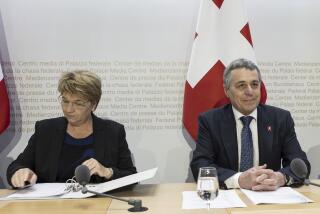Scaling the Arab summit
- Share via
THE ARAB SUMMIT is a theater of low expectations. The less one expects from this meeting of Arab-world heads of state, the less one will be disappointed. Past sessions have featured literal food fights, name-calling and hysterical condemnations of Israel.
Yet there are signs that the meeting of the 22-member Arab League convening today in Riyadh, Saudi Arabia, might be more significant than usual.
For one thing, nearly everyone who is anyone is coming. In recent years, summits have been postponed or sparsely attended because of pre-event squabbling -- last year more than one-third of the invitees didn’t show up, including the leaders of Egypt and Saudi Arabia. Though Libya’s Moammar Kadafi plans a boycott this year (at no great loss to the proceedings), nearly every other Arab leader is expected to be there.
More important than attendance is the possibility that substantive progress can be made on one of the region’s most intractable problems. Saudi King Abdullah ibn Abdulaziz al Saud, who earlier this month hammered together a deal to form a unity government in the Palestinian territories, is resurrecting the Saudi-brokered Israeli-Palestinian peace plan that was adopted at the Arab summit in 2002 but immediately rejected by Israel and the United States because it came during the second intifada. The world is taking that deal a lot more seriously now, and leaders at the summit are expected to rally around it.
As usual, there isn’t much hope of an immediate breakthrough. Arab governments continue to insist that the roughly 750,000 Palestinian refugees displaced in the 1948 Arab-Israeli war have the right to return before Arab countries grant Israel normal diplomatic ties. That’s a nonstarter for Israel because allowing such masses of Palestinians (and their families) would probably spell the end of the Jewish state. Still, a unified Arab position that considers granting full recognition of Israel is important because it provides a starting point for negotiations. Israeli leaders in recent weeks have shown unusual openness to discussing the Arab plan, making this the most positive development in the region in some time.
Arab unity has been a quixotic quest since its high point under Egyptian President Gamal Abdel Nasser in the 1950s. Other than disapproval of Israel, there are few things modern Arab leaders agree on -- certainly not democracy or respect for human rights, which would threaten many of the region’s most powerful regimes.
But if Arab leaders can find working consensus on Israel and the sectarian crisis in Lebanon, this meeting could lay the groundwork for a new Arab League that’s capable of playing a positive global role and not just griping from the sidelines. Just don’t set your expectations high.
More to Read
Sign up for Essential California
The most important California stories and recommendations in your inbox every morning.
You may occasionally receive promotional content from the Los Angeles Times.













